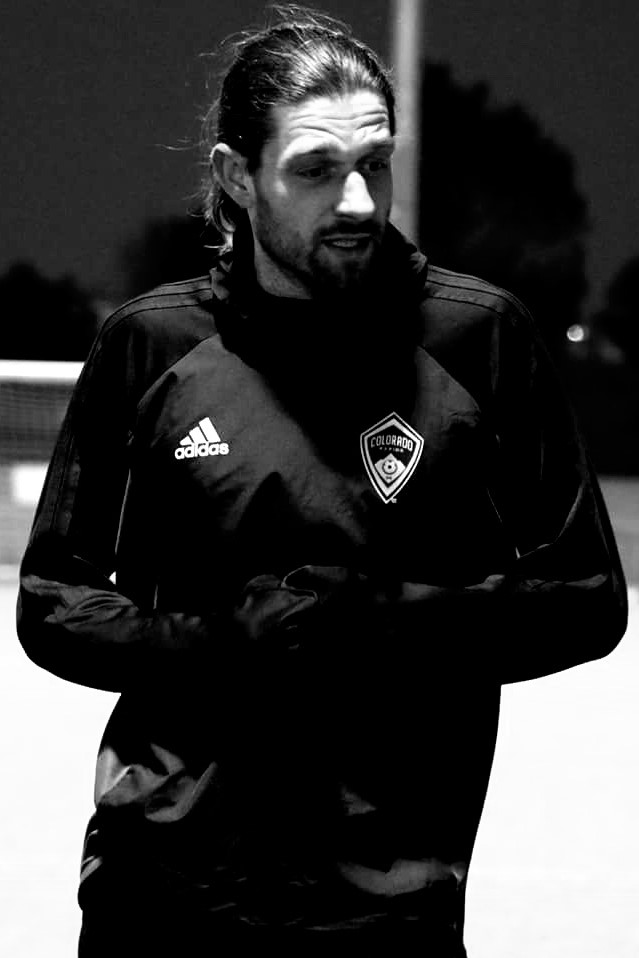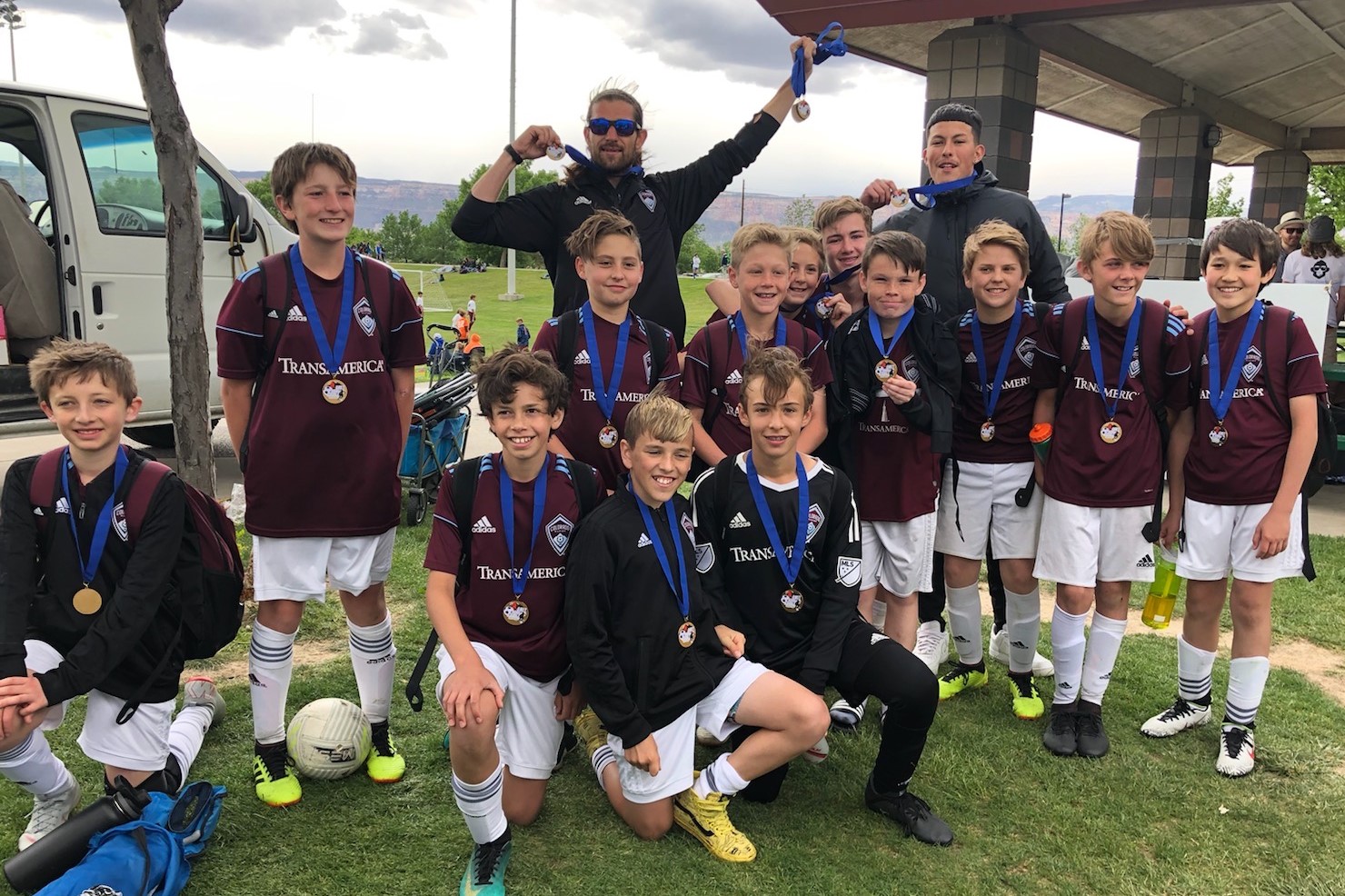
Each season, we ask CRYSC members to provide us with their thoughts and opinions on their Rapids Youth Soccer experience in our Membership Satisfaction Survey. One of the things we look for are ways to better understand the dynamics within the greater soccer community and what we offer at Rapids. Through these surveys we have been able to identify outstanding coaches that are making an impact beyond their role and finding success that extends beyond the field.
One of these coaches is Sebastian North, who manages the Rapids 06G Central Burgundy 1 and 06B Central Burgundy teams. Below you will find and interview with Sebastian where he gives us his thoughts on coaching at Rapids Youth Soccer and his experience helping players grow both on and off the field!

Sebastian, what is the first thing that comes to mind when you think about what may be enabling your coach scores?
I think it’s important to know the history of your team. For example, one of my teams had three coaches over the two seasons before I arrived due to unexpected circumstances. I was told by my team manager that these kids need someone who’s going to “show up and care and make them feel like you’re going to stick around.” At the end of every season players have asked, “you’re going to be our coach next season, right? You’re not leaving are you?”. Of course I’ll be here! I signed a contract for a full year, then renewed it for a second, and I’m committed to coaching these players.
Can you provide an example of something you do to “show up and care”?
I’m very optimistic about every player I coach. They all have something to offer. I never say to other coaches, “nah, that kid’s not good” or write kids off just because they aren’t playing as well as others on the team. I think it’s important to truly believe in each player because even if a coach never says that outright, it’s going to come out in some way or another. For example, in a game you’ll need to make a substitution and look at the bench thinking, “who can I put in?” and you won’t confidently choose a player. Instead, you hesitate or cringe for a second debating who won’t mess it all up. Think about the effect that moment can have on their confidence. Inside, you have to view the players in a positive light and accept what happens when they play.
Now that we have some background on how you think about your players, how would you describe how you interact with them?
One thing that’s big for me is not treating players like little kids. I don’t forget what it was like for me and what kind of role model I looked up to. I think they want a coach who’s fun, edgy, and not the same as their parents. I think there’s a better chance of becoming a mentor when you bring something different. This includes being different from a school teacher where they spend all day and there tends to be more rules. When kids are not at school, and they’re not at home, this is an opportunity to provide a special experience. I try not to control the players and encourage them to play free.
Whenever I see players overthinking or trying to robotically do what I said, as if it was a hard rule, that’s when I know we’ve missed the point and I need to try a new approach—an approach that allows them to experiment more. As coaches, we already have a lot of control without needing to press on the individual. At practice, for example, we make the boundaries about what the game is, what the space is, and how the game is scored. That’s enough in my opinion.
Another thing I do is emphasize “playing free”: That’s what soccer is; play. They have to explore the game to have fun and build confidence. Our minds should be in the moment and excited about trying things. Learn how to play the game but also GO FOR IT. I think there should be no holding back in the ways kids express themselves when they play, as long as they have the team’s interest in mind.
What about game days? How does “show up and care” translate to those situations?
I probably have more playing time parity than most other teams. I do not have a fixed starting lineup for any team I coach and I sub pretty fast. If you have 16 kids and they all know what your starting 11 is, the other five… we love to think that gives them friction for motivation, but not everyone works like that. I may lose games by removing stronger players to give time to ones that are struggling, but winning is not my job.
The kids themselves know who the best players on the team are so they don’t need me to emphasize it. I think showing equal opportunity from the beginning helps them feel like they belong. If a player is on the team I should use them. Confidence is crucial and when you play significantly less than others you tend to make far more errors that affect the team.
You’re obviously a coach that believes in positivity. That said, are there ever times where you believe you should be more strict?
I think the key to giving lots of freedom is you have to lay out clear guidelines—a clear standard. I told my players there are three rules:
- Do not talk and have side conversations while we’re in a huddle and follow instructions promptly. I want them to know that when things take longer than needed they are wasting THEIR time.
- Respect your teammates; no bickering. For example, during an activity the ball will be on the line and one kid will say it’s out, the other keeps playing and scores. Next thing you know there’s an argument going on. This is one of my biggest challenges. And it’s a problem because players start blaming the outcome on one small piece. That’s shirking responsibility—not what I’m trying to teach.
- Don’t cheat the game. Cheating the game would include things like not trying, using your hands, over fouling, etc. Work hard, play by the rules, and show respect to your teammates and the game.
Someone is bound to test your rules. They’re going to give you an opportunity and you have to show that the standard matters. Just by sitting a player here or there for a few minutes, I’ve been able to make a difference in the whole team. They have a bigger fear of missing out than being punished (doing sprints), an important distinction. I also encourage leaders on the team to start policing these behaviors for everyone’s benefit.
What about your interactions with parents?
I keep very close with my team managers and make sure they know how important it is for us to collaborate. They’re an important bridge. If the team manager sees you as a professional, reliable person, that message can be spread down the sideline.
I communicate with the rest of the group primarily through my game recaps and highly encourage them to read it with the players. This gives everyone an opportunity to have a small soccer chat and share their thoughts. There is a maximum 4,000 character limit on TeamConnect messages and I’m hitting 3,800 each time. First, I share my general feeling of the game. Then I write 2-3 things that were positive and 2-3 things we can improve. I almost never mention players by name or single players out for praise or malaise. Everything is framed in “we” so everyone is included and collectively responsible.
Sebastian, thank you for your time and willingness to share. Any final thoughts before we wrap up?
Somebody once told me that 90% of being a mentor is showing up. I’m not sure about the percentage but I can attest to the power of being present in every way for the players. Winning definitely matters to them but I can assure you it is not their top priority. They want to enjoy this.
We hope you enjoyed reading about Sebastian’s soccer journey and his thoughts on coaching! Watch this space, each month, for more articles highlighting the incredible coaches working at Colorado Rapids Youth Soccer Club. Thanks for reading!









